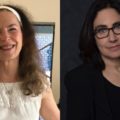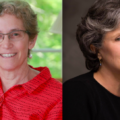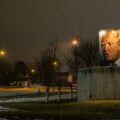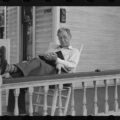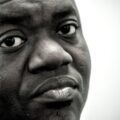Conversations: Adam Kirsch and Aviya Kushner

Aviya Kushner grew up in a Hebrew-speaking home in New York. She is the author of The Grammar of God, which was a National Jewish Book Award finalist, a Sami Rohr Prize Finalist, and one of Publishers’ Weekly‘s Top Religion Stories of the Year. She is The Forward‘s language columnist and often writes about how language shapes what we believe. Her debut poetry collection, Wolf Lamb Bomb, is forthcoming in June 2021 from Orison Books. She is an associate professor at Columbia College Chicago, where she directs the MFA Program in Creative Writing.
Adam Kirsch is a poet and critic who writes frequently on Jewish literature. His work includes three books of poems, The Thousand Wells (2002), Invasions (2008), and Emblems of the Passing World: Poems After Photographs by August Sanders (2015), and nonfiction books on Benjamin Disraeli and Lionel Trilling. The Blessing and the Curse: The Jewish People and Their Books in the 20th Century was published last year by W.W. Norton.
Kushner and Kirsch began by discussing the power of books and the way in which Jewish tradition shaped them as writers…
Aviya Kushner: In my family, we had a lot of freedom to imagine what we would become. I don’t remember encouragement of a particular path above all others, but I grew up in a house with books everywhere. There were—and are—books in the coat closet, the kitchen, the living room, and in every bedroom. Books could be found upstairs and downstairs, in the garage, and in the back seats of cars. Looking back, I think the fact that these books were in multiple languages must have affected me. There were books in Greek, Latin, Akkadian, Ugaritic, Hebrew, Aramaic, French, German, and Russian, and since my father is a mathematician, there were many books on math, which is its own language. There was plenty of sheet music, since we all played the piano, and my mother always had many cookbooks, many in Hebrew.
After my grandfather died, we shipped his library from Israel to New York, and that meant hundreds more Jewish books, as well as books on art and books in German. My grandfather was kicked out of high school by the Nazis, but he remained a lifelong reader. I think I always thought you could just be a reader, even with no degrees. And that being a reader, a lifelong learner, was a path of honor.
Judaism definitely emphasizes learning, and the Jewish tradition of learning day and night undoubtedly shaped me. I know my great-grandfather’s example of reading the Talmud late at night affected my grandfather. The bilingual education that I was lucky to receive—half the day in Hebrew, half the day in English—opened the door to all of my writing. But when I was growing up, I’m not sure I even thought it was possible to be a writer, and in particular, a living writer; the only real artist I knew was my extraordinary piano teacher, Mrs. Ludmilla Berkwic. My first encounters with writers occurred in college, at Johns Hopkins. I remember being awed by Mark Strand, and by the fact that he was a living poet, that he was standing there, in front of me. How about you, Adam?
Adam Kirsch: I also grew up in a house full of books, though they were all in English. For me, being a writer felt almost embarrassingly predestined: my father is a writer and so was my grandfather, and from an early age it was what I wanted to do, even before I knew what writing a book really meant. I started writing poetry In high school after encountering “The Waste Land”; T.S. Eliot was the first writer I read in what I now think of as a writerly way, looking for lessons and inspiration.
In retrospect, it strikes me as odd that I wasn’t at all bothered by Eliot’s open anti-semitism. Later I learned that many of his early admirers in the U.S. were Jewish, including the publisher of “The Waste Land,” Albert Boni. But it wasn’t until I got older that I began to think of my identity as a writer as linked in some way with Jewishness. As you say, Jewish culture places a high value on literacy and bookishness—reading and commenting on sacred texts has always been the central Jewish religious activity—but like a lot of American Jewish writers, I think I absorbed this tradition without being fully conscious of it.
Your family’s bookshelves with all those ancient languages doesn’t sound like a typical library in Monsey, N.Y., where I understand you grew up. Monsey is one of the great centers of Hasidism in America, and for Hasidim the lingua franca is Yiddish rather than Hebrew. What was your education like there—did you go to a religious school?
Kushner: Yes, I did go to religious schools. I went to Bais Yaakov first, where I did not understand the English-speaking teacher because I only spoke Hebrew; then I went to ASHAR; both yeshivas are in Monsey, which is indeed a center of Hasidism! The schools I went to in Monsey were Orthodox, not Hasidic, but it’s impossible to escape the Hasidic influence—Yiddish can be heard everywhere.
I went to school six days a week. The school day was divided between Hebrew and English, Jewish studies and secular. So I studied everything twice—Hebrew grammar and English grammar; Jewish history in Hebrew, and American history in English, and so on. I think the official term at the time was “dual curriculum.” But of course, in Hebrew the term for Jewish subjects is limudei kodesh, or holy studies.
In Monsey, schools are generally divided into girls’ schools and boys’ schools. The elementary school I went to had boys and girls in the same building, which was relatively liberal—other schools had boys and girls in separate buildings or on opposite sides of town—but from fourth grade onward classes were divided by gender. Many years went by before I really thought about what that gender segregation meant.
The curriculum was also to some extent determined by students’ gender—so because I was a girl, I was not taught Talmud.
That’s huge—Talmud is the most prestigious subject, and it’s really hard to understand aspects of Jewish thought without some exposure to it. I heard my brothers reciting what they had learned at home, but I was never in a classroom where Talmud was taught in Monsey. When I got to high school in Manhattan, at Ramaz, which is a co-ed high school, I had the strange experience of being placed in “lower Talmud” because I had never encountered it. I don’t think I was familiar with the concept of feminism, but in that moment of being marked as a weaker student because I had been barred from Talmud as a girl, I think I felt it for the first time.
I’m grateful to the teacher I had in that “lower” class, Rabbi Rubin, who was both patient and inspiring; I still think of the Talmudic passages he taught me. Adam, I know you immersed yourself in the Daf Yomi cycle. I’m wondering what the Talmud means to you. Did you also come to it late?
Kirsch: I grew up going to a Conservative Hebrew school that met three days a week after regular school. It was an important experience in lots of ways, but one thing it didn’t do was make me fluent in Hebrew—I still only know enough to get by in a prayer service. There was a fair amount of Bible in the curriculum, but no Talmud, which is almost never taught in non-Orthodox settings.
Not until I was in my 30s and much more immersed in Jewish texts did I realize that Judaism without Hebrew and without Talmud has very little in common with Judaism as it was lived for the last 2,500 years. That’s the main reason I undertook the Daf Yomi cycle, a study program that involves reading a page of Talmud a day for seven and a half years—to repair that gap in my knowledge. I have to admit, though, as a teenager I would have had zero patience for the Talmud, since it’s quite remote from modern values and ways of thinking.
One reason I wanted to write about 20th-century Jewish literature in “The Blessing and the Curse” was that I came to realize how my own experience of disconnection from Jewish tradition was typical for modern Jews. The Jews who left Eastern Europe for America and Palestine starting in the 1880s, or who tried to assimilate in Germany and Austria, all wanted to become modern, which meant cutting themselves loose from things like the Talmud and Yiddish. American Jews threw tradition overboard with great alacrity, as you can see from an early American Jewish novel like “The Rise of David Levinsky” (1917): an immigrant would step off the boat in lower Manhattan and go straight to a barber to get his Jewish beard and sidelocks cut off.
Israeli Jews had different problems with Judaism: Zionism saw Orthodoxy as retrograde and blamed it for keeping the Jews passive and apolitical, to their own cost. Most people today may not realize that the creation of a Hebrew-speaking state in the traditional Jewish “holy land” was actually very anti-Jewish act, in religious terms. Judaism had always seen the return to Zion as something that would be brought about by God when the Messiah came; Hebrew was a holy tongue that should be reserved for sacred purposes. The religious establishment mostly hated the Zionists, who were almost all socialists and atheists of one stripe or another.
For me, it was enlightening to think of Jewish writing in all its forms—European, American and Israeli—as connected, part of a single literature. I wonder if you think of yourself as being a Jewish writer in this large sense?
Kushner: Thank you for this beautiful question—and yes, I do feel part of the world Jewish literary tradition. I first started to feel this way while writing book reviews, when I realized that there was a definite connection between contemporary Israeli literature, European Jewish literature, and Jewish writing in America. I sort of had a “world Jewish poetry” beat at The Jerusalem Post for a while, and writing those pieces month after month, I could see that it was all part of the same literary tradition and communal conversation, stretching back thousands of years.
I always felt very connected to Jewish tradition and especially Jewish texts—probably because of my religious education. But I did not feel part of a world literary tradition until I started writing those reviews, and I could sense a direct line between prophecy and poetry. I could hear young Israeli poets like Shimon Adaf riffing off Jeremiah, and I could hear Paul Celan considering Isaiah. Similarly, I could feel a connection between the stories related in the Talmud, the stories of Isaac Bashevis Singer, and the work of Nathan Englander.
Now, when I read Peter Orner, I can hear Isaac Babel, but I can also hear the Yiddish writers who Babel clearly read; I was recently re-reading Babel’s diary and noticing how familiar he was with religious tradition—he knew Jewish languages and Jewish texts. I see similar concerns across wide swaths of time in Jewish writers working in different languages, even if they lived completely secular lives; there are shared borders between Natalia Ginzburg, Clarice Lispector, and Avrom Sutzkever. I think there is also a shared understanding of history; I was moved by the connection Cynthia Ozick sees between Franz Kafka and Isaac Babel, with one imagining a nightmare and the other living it, and I see those two options repeating in a lot of Jewish literature.
It’s so interesting that you felt a disconnection from Jewish tradition, and that you see this as typical. I think there may be a divide here between the Orthodox educational system and other options.. If anything, I felt disconnected from secular culture. I definitely did not feel connected to a lot of contemporary and much-praised American literature—for instance, I never got into Richard Ford or John Updike. So perhaps we had somewhat opposite experiences!
If I may go back to the Talmud for a moment, I think that in the very beginning I didn’t think about how the text itself is patriarchal; I was focused on the fact that it was a text that I had been banned from. I spent time thinking about what else I had not been taught. But I do remember being awed by it from the very start, loving the structure and the questions that led to more questions. I especially loved how the teacher, Rabbi Rubin, clearly knew everything he was teaching us by heart, and how he tried to get us to ask more questions and to anticipate question possibilities. I remember feeling let in.
I also remember taking a volume of the Talmud on the bus home—I used to commute on the Chassidishe bus—and thinking that I was carrying what the men on the other side of the mechitza, or the curtain separating men and women, were reading. I should say that all those bus rides, men would read the Talmud; women prayed or recited Psalms. So in the beginning I was just curious about what the other side was reading, what it had access to.
I’m curious about your philosophy as a critic. Do you see yourself as trying to let the reader in? Or as someone trying to connect ideas? And I also wonder how you see yourself in relation to the Jewish tradition of commentary.
Kirsch: I’m glad you mentioned the tradition of Jewish textual commentary and its relation to literary criticism. I’ve always been struck by the remarkable number of first-generation American Jewish writers who were important literary critics—notably the group known as the New York Intellectuals, which included Lionel Trilling, Irving Howe and Alfred Kazin. Henry James was an anti-Semite, but his five-volume biography was written by Leon Edel, an American Jew. The first Norton Anthology of English Literature was created by a Jewish scholar, M.H. Abrams.
It’s tempting to say that somehow the tradition of Jewish textual study and commentary was translated into the study of secular literature. But it’s not clear how this could have happened, since none of these American Jewish writers grew up with any knowledge of that tradition. The only American writer I know of who writes about studying Talmud as a boy is Herman Wouk; the others mainly saw Judaism as a relic of Old World superstition, something to discard in favor of up-to-date things like socialism and modernist literature.
One reason I wanted to do Daf Yomi was to see for myself if there was a relationship between Talmud study and literary study. I found that there’s not really, at least not in any concrete sense: the Talmud is totally unlike a literary text and reading it requires its own set of tools, some of which seem bizarre by modern standards. But the idea that midrash or interpretation is at least as important as original creation must be somewhere deep in Jewish culture, since it seems to inspire writers who have never read an actual rabbinic midrash. When I’m writing about Jewish texts, I think one of my goals is to make such connections explicit—to show readers that their understanding of literature and the world might be more traditional than they know.
Kushner: That’s very moving, to realize that the idea of midrash affects writers who have never read an actual rabbinic midrash; the tradition is so deep that it can be felt. And I can certainly feel your commitment to making connections explicit in your work, and especially in how you order your books; it’s something I appreciate very much.
I am also intrigued by the line between interpretation and original creation. I thought about this a lot while working on the poems that became Wolf Lamb Bomb. What I found myself exploring, for years, was the border between poetry and prophecy, between “original” writing and ancient text. I kept asking myself what I was adding. And more deeply, what could anyone add in a world that already included lines as beautiful as Isaiah’s?
But of course, “adding” or “interpreting” is a very old Jewish tradition, the structure and rhythm of learning. Perhaps Isaac Bashevis Singer said it best in his Nobel acceptance speech: “In the history of old Jewish literature there was never any basic difference between the poet and the prophet.” I love returning to that line, in times of social and political upheaval. I believe that the poet’s responsibility to see and to comment, and to consider how the prophetic tradition of justice—beautifully rendered—remains with us. I think that’s why Isaiah has always been my favorite poet, and why I found myself “talking back” through the distance of centuries.
What is striking about the poetry of the prophets is how it remains relevant, even if it describes events from thousands of years ago, detailing the exploits of rulers and armies that have long since left the earth. This always reminds me of the eternal nature of poetry, and I think that belief in the eternal—in texts that will last—is something that can be felt across Jewish literature.
I find myself drawn to projects that in some way engage with the hope of the eternal, with subjects that transcend one moment in time and instead attempt to speak to all of time. I think that’s why Isaiah has always been my favorite poet, and why I found myself “talking back” through the distance of centuries.
Whenever I think I am working on something new and very timely, I eventually realize it’s something very old, something that never really left the stage of the earth, something that was talked about for at least a thousand years before I was born.

